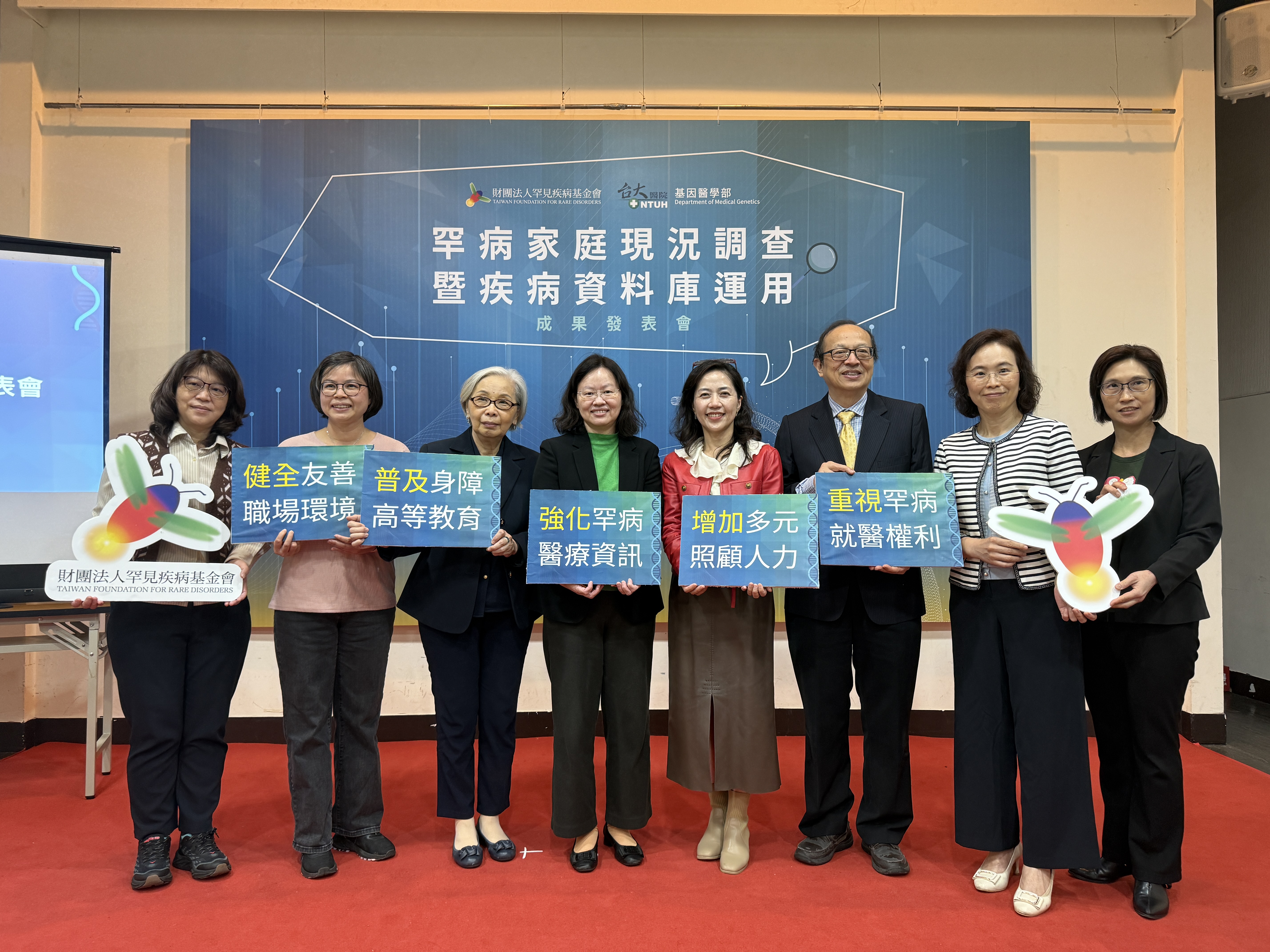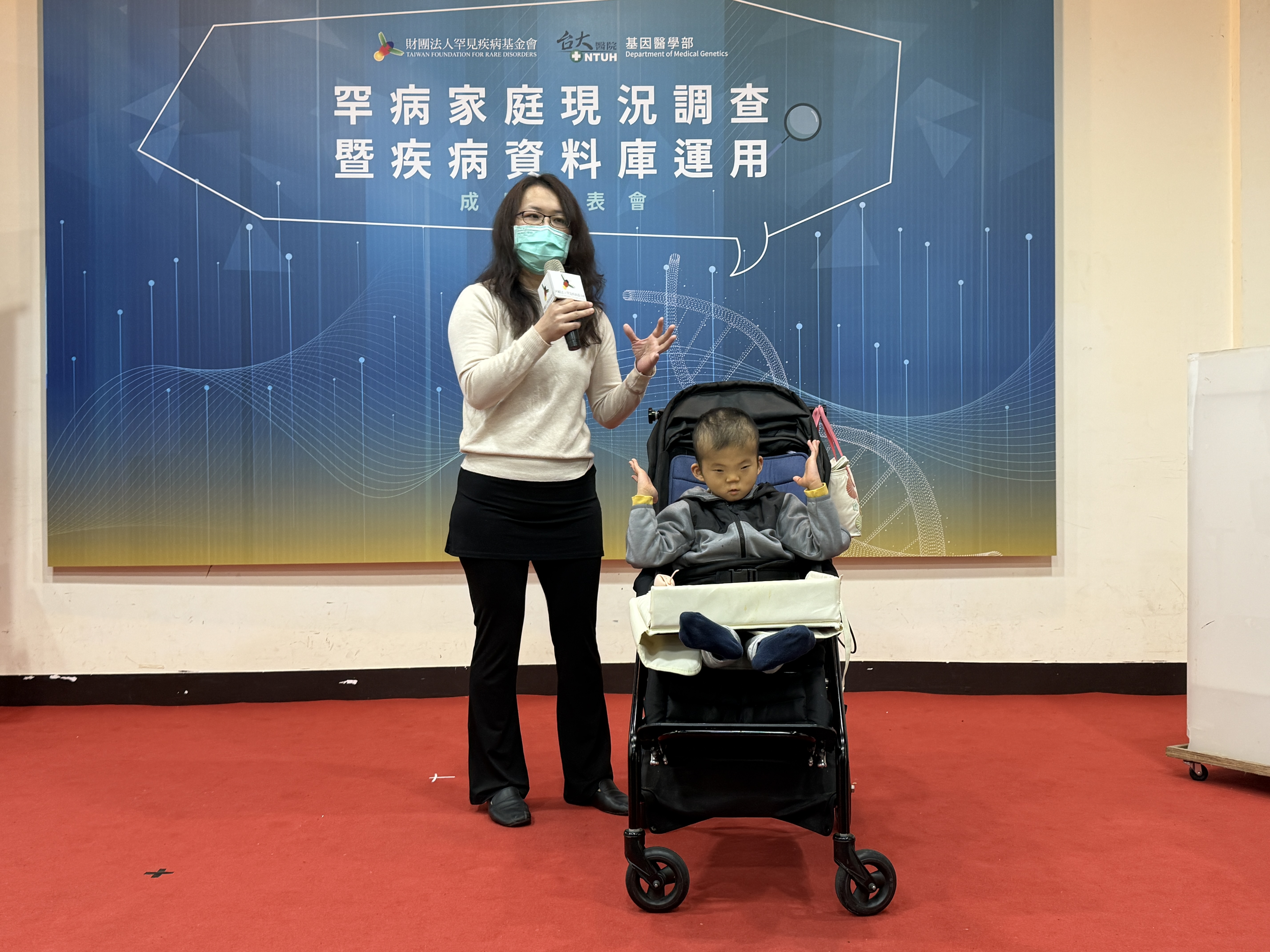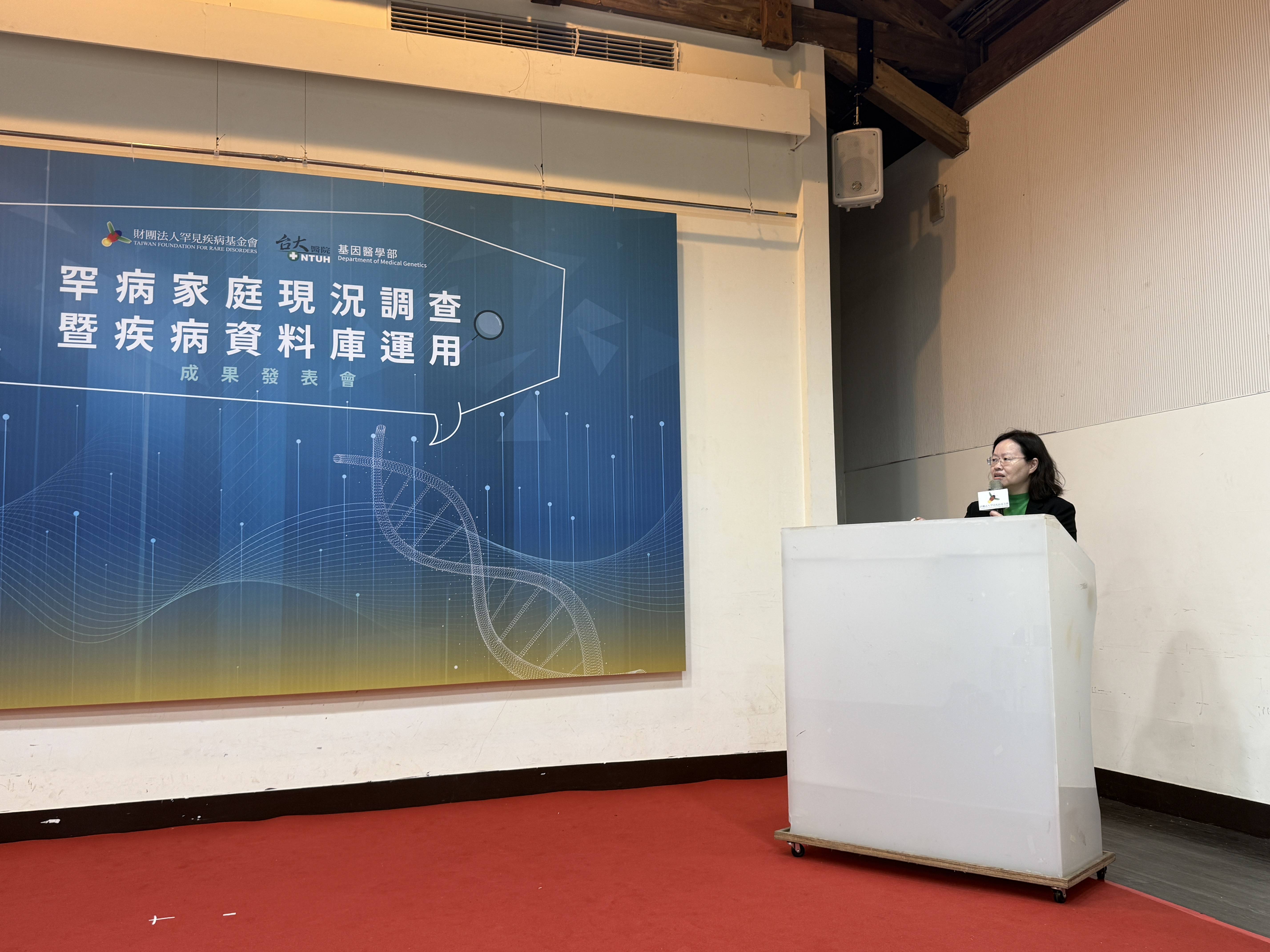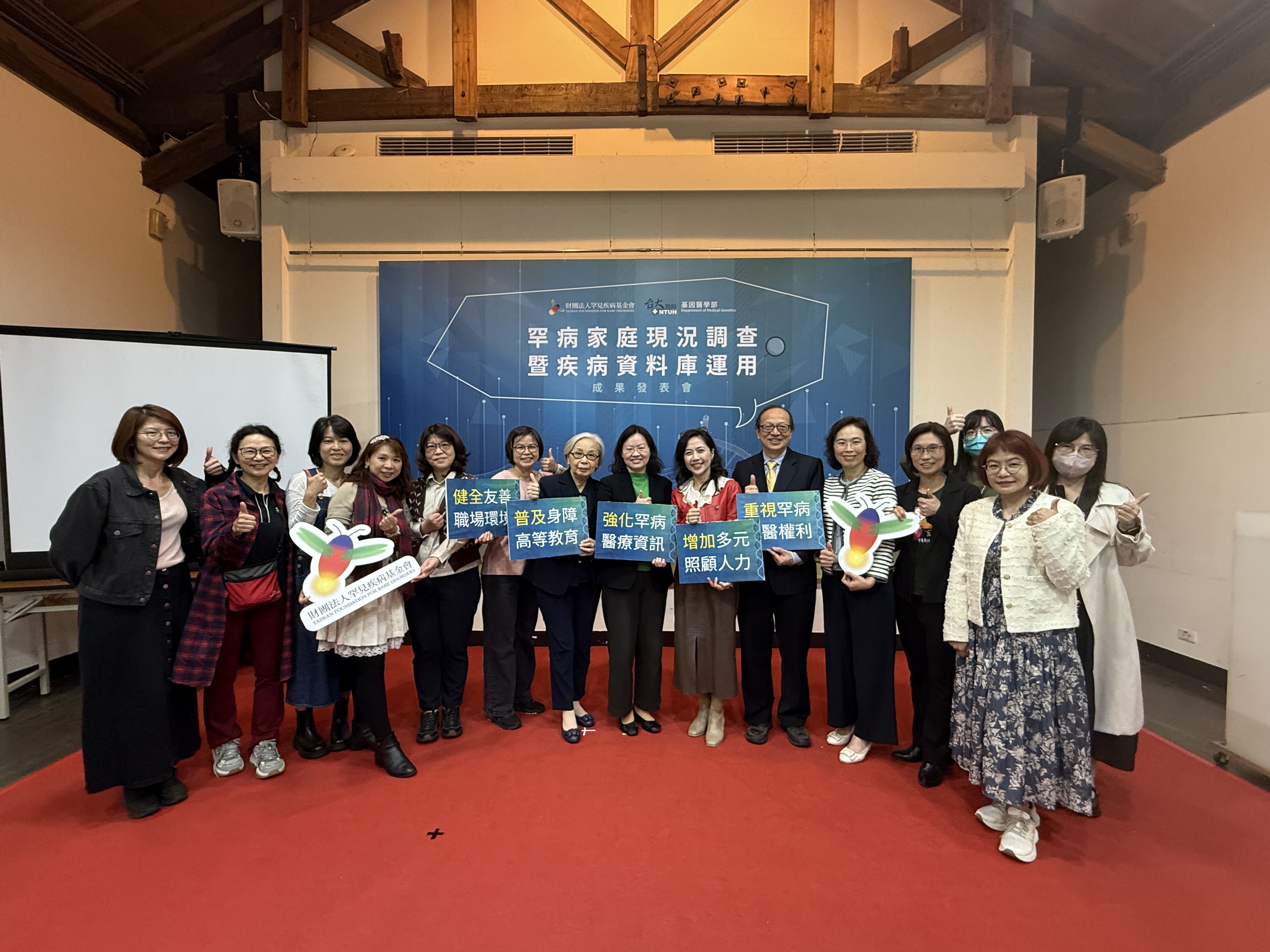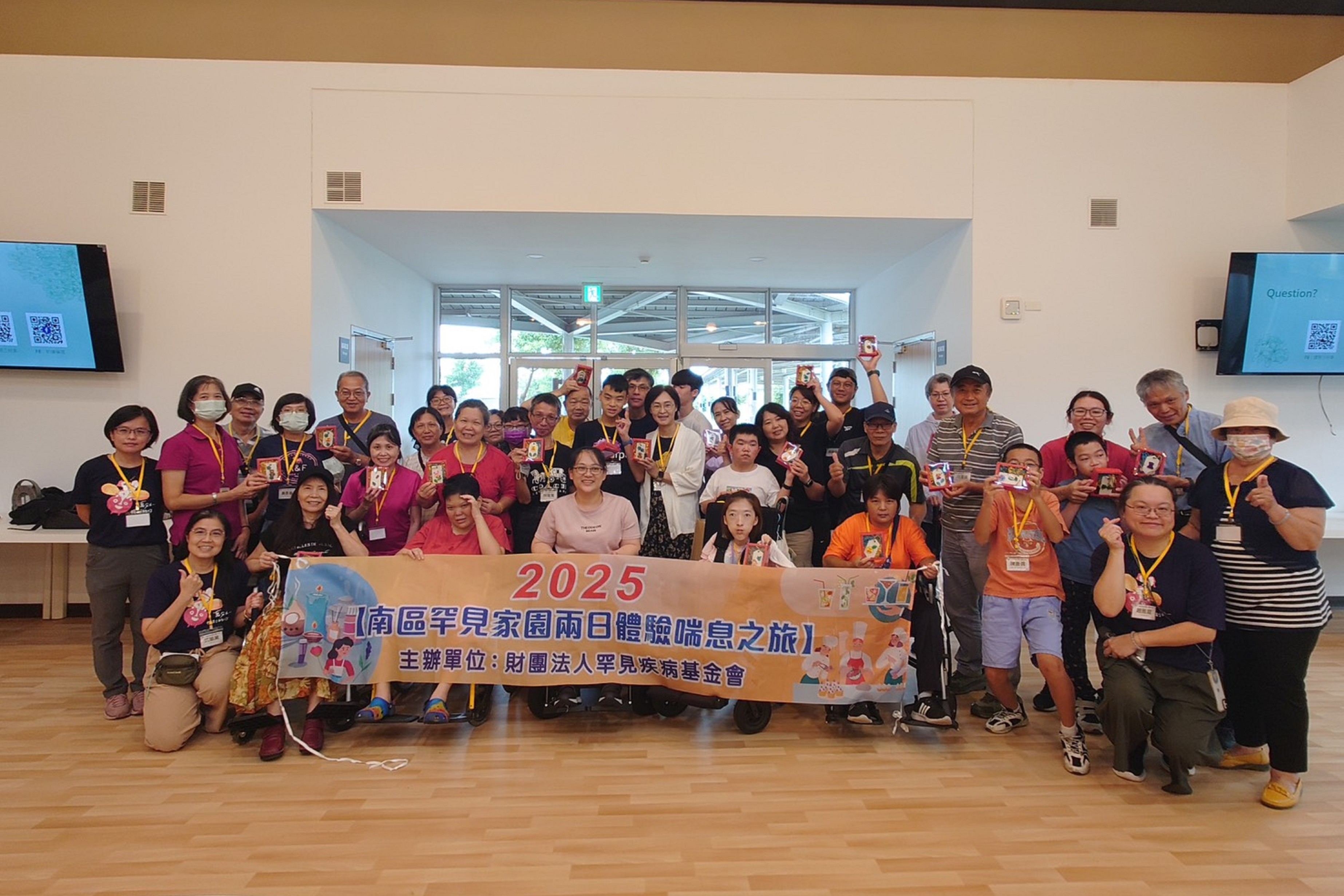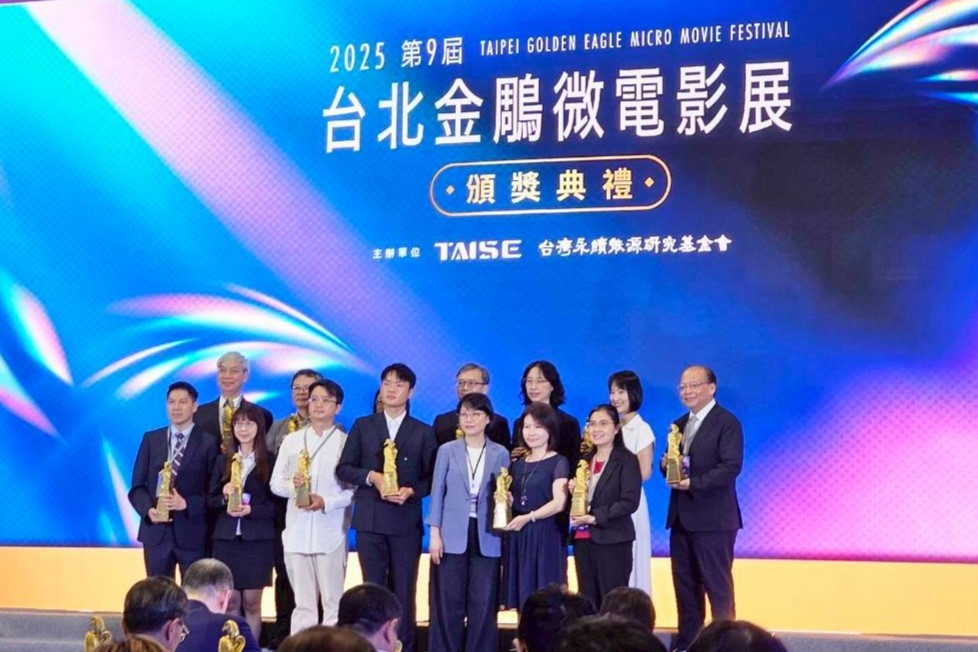News
Press Conference: Patient Survey & RD Database
|Press Conference|Results Presentation for the "Survey on the Current Situation of Rare-Disease Families" and "Disease-Database Utilization"
|Date and Time|Friday, March 14, 2025, 10:30-11:30
|Venue|Taipei Mayor's Residence
|Organizers|Taiwan Foundation for Rare Disorders (TFRD) and the Department of Medical Genetics, National Taiwan University Hospital (NTUH)
Taiwan's First Recorded Case of This Rare Disease: Anxious, Helpless, and With Nowhere to Turn
Rare-disease patients and their families are often overwhelmed when they first receive a diagnosis. They urgently need access to reliable resources and a deeper understanding of the condition.
Take Quan-Quan as an example. At birth, he presented multiple congenital anomalies - including pericardial effusion (fluid around the heart - requiring surgery), cleft palate (split in the roof of the mouth), and respiratory distress. For a long time, the hospital was unable to identify the underlying cause, which meant no targeted treatment could be provided. His parents were left anxious and uncertain about his future.
Eventually, through next-generation sequencing (NGS), Quan-Quan was diagnosed with Ayme-Gripp syndrome - the first reported case in Taiwan at the time. Even medical professionals had little knowledge of the disorder. It had not yet been officially recognized as a rare disease, and no other patients could be found. As a result, information on both the condition and appropriate care was extremely limited.
Twenty years ago, information on rare diseases was difficult to access. Physicians and the public often relied on fragmented literature from abroad, and translation barriers left patient families even more confused. Rare diseases are numerous, extremely rare, and often involve complex symptoms affecting multiple body systems. In those early years, channels for obtaining accurate information were very limited. Some conditions even appeared more frequently in the Chinese-speaking world, highlighting the urgent need for a comprehensive Chinese-language database on rare genetic diseases.
In 2005, in response to these challenges, TFRD commissioned the Department of Medical Genetics at NTUH to launch the project "Rare Genetic Disease Database and Online Consultation Service", establishing the "Genes-at-Taiwan" Rare Genetic Disease Portal. The project, built on a structured framework for organizing rare genetic disease information, integrates the latest and most comprehensive data into a continuously updated database. The portal now features disease profiles, testing information, drug records, and medical news. Currently, it features 365 disease overviews, 665 testing entries, 123 drug records, and 91 popular-science updates. In addition, its real-time online consultation service is operated by medical professionals, making it the world's largest Chinese-language database on rare diseases.
Professor Min-Chieh Tseng, co-founder of the Taiwan Foundation for Rare Disorders, emphasized: "When rare-disease patients receive an accurate diagnosis early on, the benefits of subsequent treatment and care are greatly enhanced. Therefore, giving physicians and families access to complete disease information is critical. The Foundation recognized this problem early on and, for twenty consecutive years, has worked in continuous cooperation with the Department of Medical Genetics at NTUH, investing nearly NT$15 million to build the most comprehensive Chinese-language rare-disease database."
Genes-at-Taiwan: Professionally Vetted by Physicians
Genes-at-Taiwan emphasizes professional medical oversight. Instead of merely translating foreign literature, all content is thoroughly recompiled and peer reviewed. Each disease entry provides detailed information on etiology, inheritance patterns, incidence, clinical symptoms, diagnosis, treatment, and prognosis. Just as importantly, the portal connects users with Taiwan-specific resources, such as local genetic testing services and a list of orphan drugs approved and available domestically. This approach allows physicians, patients, and the public to access reliable, comprehensive, and accurate disease information amid the vast and often overwhelming online resources.
Using Quan-Quan's Ayme-Gripp syndrome - an ultra-rare disease - as an example, the Genes-at-Taiwan team uploaded a description of the condition to the site just six months after it was officially recognized as a rare disease by the Ministry of Health and Welfare, making it available for physicians to consult.
When clinicians encounter patients exhibiting the distinctive clinical features of Ayme-Gripp syndrome, they can now order MAF gene testing to confirm the diagnosis. This genetic test checks for mutations in the MAF gene, which are responsible for the condition, allowing doctors to provide a definitive diagnosis. With increased awareness among physicians and the availability of this test, two additional cases were quickly identified, and the newly diagnosed parents no longer face the same uncertainty regarding caregiving and treatment options.
Dr. Ying-Hsiu Chien, Director of the Department of Medical Genetics at NTUH, explained: "In the early days, whenever we suspected a rare disease, we had to comb through foreign literature, with almost no one to consult. It was difficult enough for geneticists, and even harder for physicians in other specialties. As a result, patients often waited a very long time for a definitive diagnosis. We hope that this kind of database will be helpful not only to the medical community but also to academia."
Principal investigator Dr. Ni-Chung Lee noted: "Everyone knows that Taiwan's medical system is highly developed, and Genes-at-Taiwan benefits from this strength. By drawing on physicians' clinical experience, the portal has compiled comprehensive data on diseases and treatments, including many conditions more commonly seen in the Chinese-speaking world. As a result, we have visitors from across Asia - including China, Japan, Malaysia, Macau, and Hong Kong - as well as inquiries from the United States and Australia. Genes-at-Taiwan is an internationalized platform, and we hope it can help physicians and patients beyond Taiwan gain access to more accurate information on rare diseases."
Aligning with Patients' Evolving Needs - Foundation Services Adjusted in Tandem
To mark its 25th anniversary, TFRD conducted the first "Survey on the Living Conditions and Needs of Rare-Disease Patients" between 2023 and 2024. The survey targeted 7,231 patients directly served by the Foundation and collected 4,418 valid responses.
The survey examined eight major areas: (1) Household basic data; (2) Patient basic data; (3) Education; (4) Employment; (5) Daily living and cognitive function; (6) Daily care situation; (7) Medical situation; (8) Use of government and private resources.
Overall, respondents identified living allowances or related cost subsidies as their top need (63%), followed by care services (35%). Given the heavy financial burden of medical expenses and caregiving, the Foundation provides subsidies for medical costs, daily living, and long-term care. Even during the fundraising challenges of the COVID-19 pandemic, it launched a special living-subsidy program to support rare-disease families affected by unemployment.
In addition, caregiving pressures prevent more than half of rare-disease families from entering the workforce. To address this, the Foundation has actively promoted the "Rare Professionals Career Project" training program in recent years, exploring alternative employment models that help families return to work.
For mobility and social participation, the long-running "Accessible-Taxi Fare-Subsidy Program" supports patients' desire for greater community involvement, while the "Personal-Assistant Training and Subsidy Program" enables patients to venture outside with trained aides, fostering independence.
The newly opened Rare Disease Welfare Center develops specialized programs tailored to family needs. Among these, the Bathing-Experience Program provides specialized bathing aids and services, offering practical support for one of the most challenging daily-care tasks.
First Large-Scale Rare-Disease Survey - Hoping the Government Will Hear Rare Voices
This survey represents the first large-scale investigation of Taiwan's rare-disease population. The analyzed data highlight both the expectations of rare-disease families and the unmet needs they continue to face. Based on these findings, the Taiwan Foundation for Rare Disorders offers the following recommendations regarding the government's current rare-disease policies:
1 - Strengthen Rare-Disease Medical Information: Nearly 80% of patients experience a delay of approximately two to three years between the onset of symptoms and a definitive diagnosis. This indicates that both vertical integration and horizontal linkage of domestic rare-disease medical information still need improvement. The government is encouraged to enhance rare-disease diagnosis and treatment by building a convenient genetic-testing system, expanding test subsidies, promoting professional knowledge on rare diseases, and using big data to integrate rare-disease services. These measures would help families access timely medical care as early as possible.
2 - Respect Rare-Disease Patients' Right to Medical Care: Most rare-disease patients require long-term medical attention. Under the current National Health Insurance (NHI) system - particularly the recent "hospital-specific global budget" policy - patients worry about being transferred between hospitals without receiving proper treatment. The NHI Administration should implement audits and oversight to prevent such situations. The survey also shows that many respondents hope the government will expand drug coverage and ease the criteria and limits for financial subsidies.
3 - Promote Higher Education for Persons with Disabilities: The data show that more than half of rare-disease patients have progressed to colleges and universities. The government is encouraged to increase enrollment opportunities in programs for students with disabilities, providing a broader range of learning options and supporting educational inclusion.
4 - Increase Diverse Caregiving Manpower: In most families, relatives serve as the primary caregivers, and the long-term pressures of caregiving can lead to physical and mental exhaustion. Many foreign caregivers are reluctant to care for patients with severe rare diseases, while domestic caregiving costs continue to rise. Families hope the government will provide a wider range of caregiving personnel to help meet these needs.
5 - Create a Supportive and Inclusive Workplace Environment: Nearly 70% of rare-disease patients are currently unemployed, largely because their medical conditions limit smooth entry into the job market. Through job redesign and adjustments to employment models, the government should meet the practical needs of rare-disease patients and help create workplaces that are supportive and inclusive.
Marking TFRD's 25th anniversary and the 20th year of Genes-at-Taiwan, Taiwan has made significant progress in disseminating rare-disease information and improving patient care. Nevertheless, as medical technology continues to advance, ongoing updates are essential. Care policies must also evolve alongside the steady growth of the patient population. Collaboration among the medical community, patient organizations, and government agencies remains crucial to ensure comprehensive support for rare-disease patients.
Translator: Hector Mao (MS)
Reviewer: Giancarlo Rotolo (MS)

